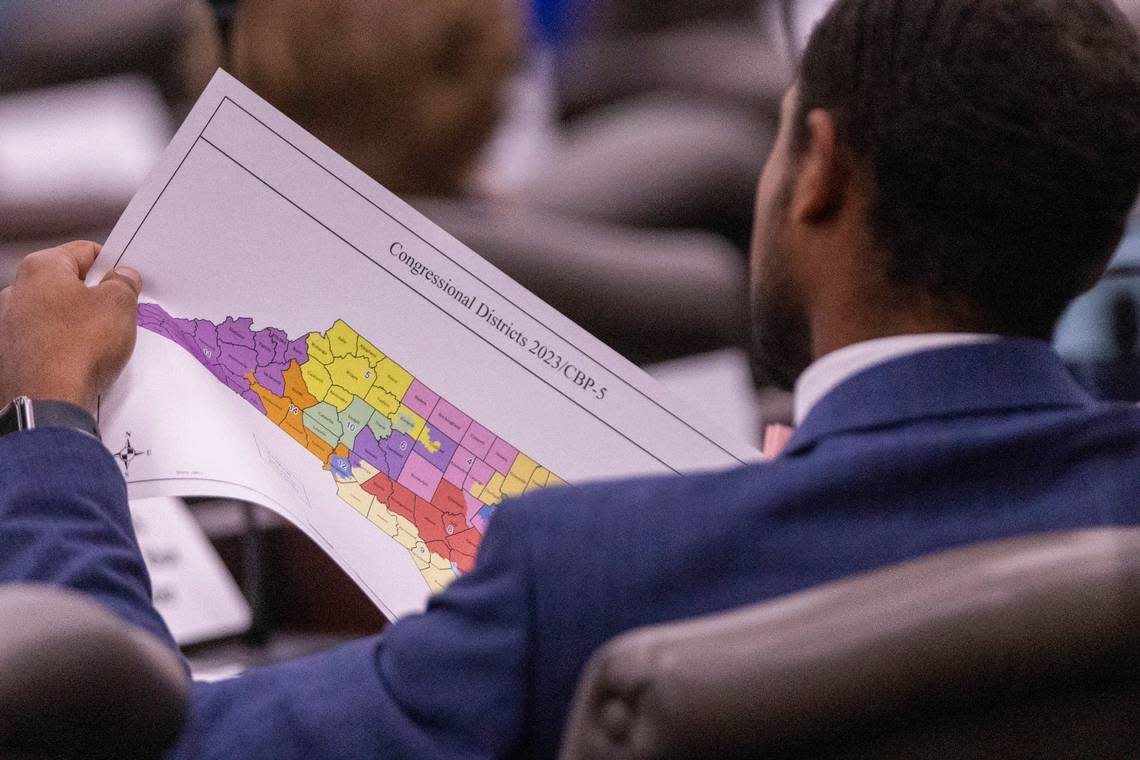Black, Latino voters sue to block new NC congressional map, alleging racial gerrymandering
A group of Black and Latino voters sued the state on Monday over a new map of North Carolina’s congressional districts, which they argue unconstitutionally discriminates against minority voters.
Republicans in the legislature drew a congressional map with 10 Republican-leaning districts, three Democratic-leaning districts and one swing district.
“By strategically packing and cracking North Carolina’s minority voters, the 2023 congressional plan entrenches the state’s white majority and erases the gains made by voters of color in the 2020 and 2022 election cycles,” the lawsuit says.
Plaintiffs have requested a three-judge panel to hear the case and are asking for an injunction to prevent congressional elections from being run in the current map.
North Carolina House Speaker Tim Moore released a statement calling the lawsuit “baseless” shortly after it was filed.
“It has taken Democratic activists over a month after these maps were approved by the General Assembly to concoct these baseless allegations,” he said. “This is a desperate attempt to throw chaos into North Carolina’s elections, on the first day of candidate filing no less. We are fully confident that these maps are going to be used in this election and every election this decade.”

What’s next?
The challenge comes on the same day that candidate filing for the 2024 election began. If the court acts quickly to grant the request for an injunction, the filing process could be disrupted. If the new maps are temporarily blocked from taking effect, congressional candidates would not be able to file to run in districts that may be struck down.
This happened in 2021, when the state Supreme Court halted candidate filing and delayed the state’s primary election in response to gerrymandering lawsuits.
So far, though, plaintiffs do not appear to have filed a motion to expedite the case. Candidate filing ends on Dec. 15.
The lawsuit alleges that districts 1, 6, 12 and 14 — which span Eastern North Carolina, the Triad, Mecklenburg County and more — are all racial gerrymanders and must be struck down.
Districts 6 and 14 are likely to flip to Republicans in the 2024 election. District 1, currently represented by U.S. Rep. Don Davis, is highly competitive and District 12, currently represented by U.S. Rep. Alma Adams, appears to be safely Democratic.
Democratic Rep. Wiley Nickel, who represents District 13, which is not challenged in the lawsuit, has not announced if he will run for reelection under the new map. On Monday, he released a statement praising the lawsuit.
“The maps passed by the Republican General Assembly totally robs the voters of North Carolina of their voice in our elections,” he said. “I believe this map is unconstitutional, illegal, and I’m looking forward to the courts weighing in. Gerrymandering suppresses the power of the vote, and racial gerrymandering has unfortunately been the modus operandi for Republican legislators in North Carolina. Our state deserves better.”
More maps challenges in the works
This is the second lawsuit to target the state’s new electoral districts, which passed the Republican-controlled legislature in October. Two Black voters challenged the new state Senate map, which they argue illegally dilutes the voting power of Black residents in Eastern North Carolina.
Plaintiffs in that case had asked the judge to decide whether to block the new map before candidate filing begins, but the judge declined to expedite the schedule.
Due to recent decisions from conservative courts at the state and federal levels, partisan gerrymandering is no longer a valid legal challenge. During the redistricting process this year, Republicans were open about drawing maps that benefited their own party, while stressing that they did so within legal bounds.
While courts won’t rule on partisan gerrymandering, racial gerrymandering is still illegal under federal law. The federal Voting Rights Act prohibits any election law that discriminates based on race, and the U.S. Supreme Court recently agreed with plaintiffs in Alabama who argued that the state’s electoral maps unlawfully diluted the votes of Black residents.






